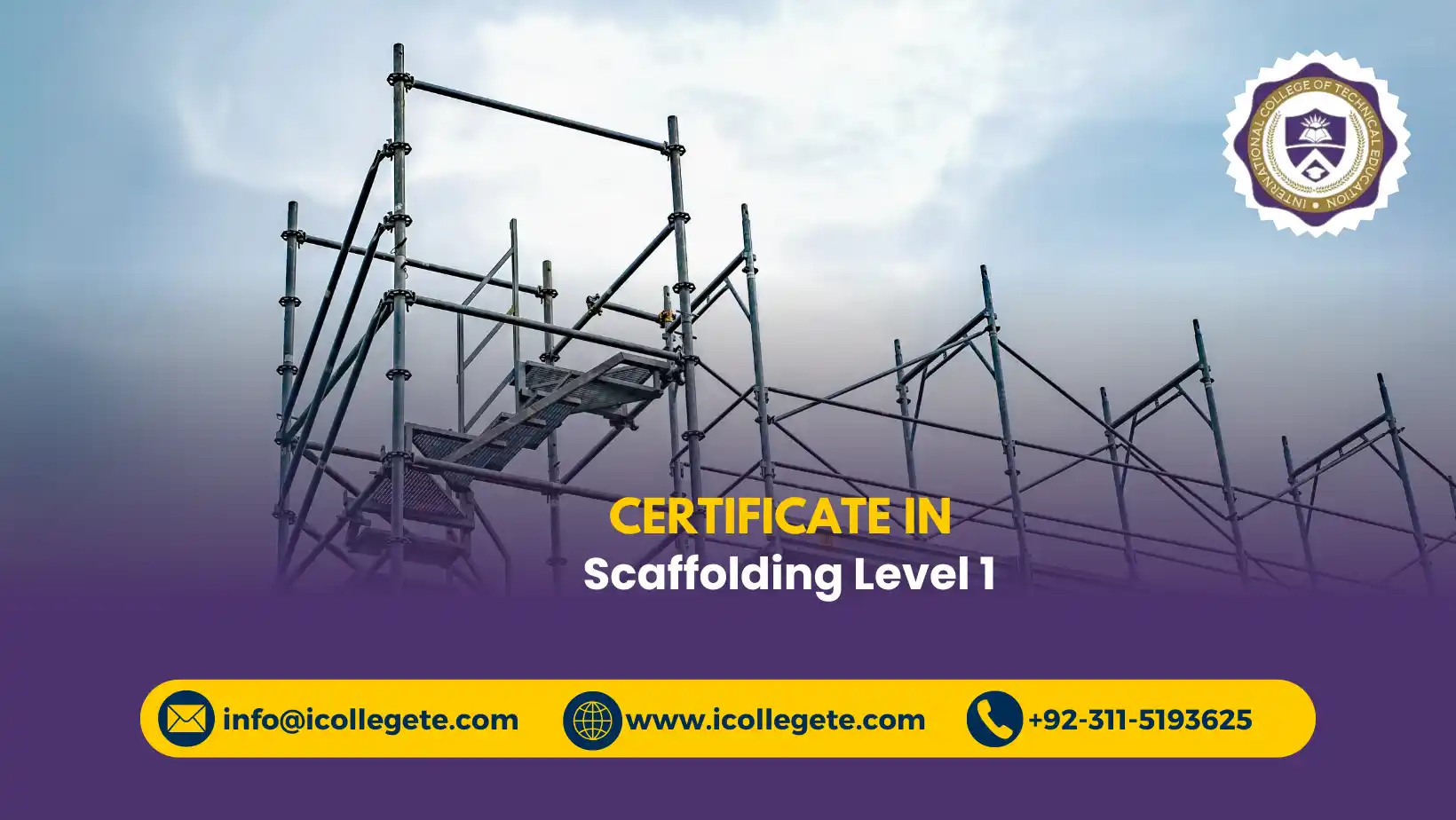If you’re looking to start a career in construction or advance your skills in this dynamic field, a Scaffolding Level 1 course is an excellent place to begin. The course is designed to equip you with the essential knowledge and skills required for scaffolding work, which is crucial for the safe and effective completion of construction projects. This guide provides an in-depth look at the Scaffolding Level 1 course in Rawalpindi, highlighting its course introduction, overview, study units, learning outcomes, benefits, target audience, and future progression opportunities.
Scaffolding plays a vital role in the construction and maintenance of buildings. It is used to support workers and materials during construction, providing a secure platform to carry out work at height. The Scaffolding Level 1 course is designed to provide beginners with a foundational understanding of scaffolding operations, health and safety practices, and basic construction techniques.
The course is tailored for those who want to begin a career in the construction industry or those looking to gain certification to improve their employability. In Rawalpindi, this course is offered by accredited institutions, ensuring a high standard of training and certification that aligns with industry standards.
The Scaffolding Level 1 course in Rawalpindi focuses on introducing students to basic scaffolding techniques, safety protocols, and regulatory guidelines that are essential for anyone working in this field. The course provides practical training in constructing and dismantling scaffolds, understanding scaffold design principles, and applying safety measures to prevent accidents.
The course duration typically ranges from a few weeks to a couple of months, depending on the institution and the frequency of classes. It combines both theoretical instruction and hands-on experience to ensure that learners are fully prepared to enter the workforce.
Study Units
The course is divided into several study units that cover the fundamental aspects of scaffolding. Some of the key units include:
- Introduction to Scaffolding
- Types of scaffolds and their uses
- Scaffold components and materials
- Basic scaffolding terminology
- Scaffolding Safety Regulations
- Understanding health and safety standards
- Identifying hazards and risks on a construction site
- Personal protective equipment (PPE) and its proper use
- Erecting and Dismantling Scaffolds
- Step-by-step process of scaffold assembly
- Techniques for safe scaffold dismantling
- Proper use of tools and equipment
- Scaffold Inspection and Maintenance
- Inspecting scaffolds for stability and safety
- Identifying potential faults and damages
- Maintenance practices for scaffolding equipment
- Scaffolding for Special Projects
- Scaffolding techniques for complex structures
- Working with scaffolds on irregular terrains or heights
Learning Outcomes
By the end of the Scaffolding Level 1 course, learners will:
- Understand the basic principles of scaffolding and its importance in the construction industry.
- Be able to safely erect, dismantle, and inspect scaffolds.
- Have a solid understanding of health and safety regulations related to scaffolding work.
- Gain hands-on experience in using scaffolding equipment and tools.
- Be equipped with the skills needed to work effectively as part of a scaffolding team.
- Understand the importance of maintaining safe and compliant work practices at all times.
Course Benefits
Taking the Scaffolding Level 1 course in Rawalpindi offers numerous benefits to learners:
- Career Opportunities: The construction industry is always in demand of qualified scaffolding workers. By completing this course, you increase your employability in this sector.
- Industry Recognition: The course is designed to meet industry standards, and the certification you receive upon completion is widely recognized by construction companies.
- Safety Awareness: The course emphasizes safety, ensuring that you can work safely at heights and handle scaffolding equipment with confidence.
- Practical Skills: With a mix of theoretical learning and practical application, you will gain the hands-on skills needed for immediate job readiness.
- Improved Earning Potential: Certified scaffolding workers are in high demand, which can lead to higher-paying job opportunities.
Who Is This Course For?
The Scaffolding Level 1 course is suitable for:
- Aspiring Construction Workers: If you’re interested in starting a career in construction, this course is an ideal first step.
- Entry-Level Workers: Individuals who want to improve their qualifications and gain specific scaffolding skills.
- Construction Managers and Supervisors: Those looking to enhance their knowledge of scaffolding safety and operations.
- Tradespeople Looking to Upskill: Electricians, plumbers, and other tradespeople who may require scaffolding knowledge for specific jobs.
Future Progression
Completing the Scaffolding Level 1 course can open the door to various career progression opportunities in the construction industry. After completing Level 1, you may choose to further your studies with:
- Scaffolding Level 2 and 3: These advanced levels offer deeper knowledge and training in scaffolding, including more complex scaffolding techniques and supervisory skills.
- Health and Safety Certifications: Pursuing additional qualifications in health and safety, such as NEBOSH or IOSH, can further enhance your qualifications for higher-level roles in construction management.
- Specialized Training: You may choose to specialize in specific types of scaffolding, such as hanging scaffolds, suspended scaffolds, or scaffolding for industrial projects.
- Supervisory or Management Roles: With the right experience and qualifications, you can move into supervisory or management positions, overseeing scaffolding teams and larger construction projects.
The Scaffolding Level 1 course in Rawalpindi provides a solid foundation for anyone interested in pursuing a career in the construction industry. With a focus on safety, practical skills, and industry standards, this course offers significant value to both beginners and those looking to upskill. By completing this course, you’ll be well-equipped to contribute effectively to construction projects and build a rewarding career in the field.





